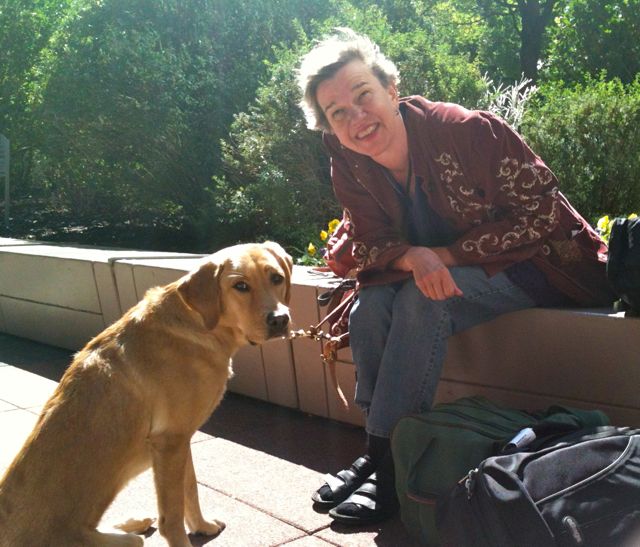
Mike took this photo of us when we were in sunny Denver. I betcha Whitney is staring right at him, right?
When my Seeing Eye dog wants my husband Mike’s attention, she sits down, looks his way, and bats her big beautiful brown eyes. To get my attention, she butts her head against my computer chair. If I’m standing up, she nudges my hand. Whitney drops the ball at Mike’s feet when they play catch. When she’s playing catch with me,Whitney places the ball right in my palm. That way she doesn’t have to sit there waiting while I grope around trying to find the dang thing.
Does Whitney know I can’t see her? A post on the Psychology Today blog refers to a French researcher who did some experiments to try and find this out. Well, not just about Whitney. About guide dogs in general. Do they look toward their blind user’s face less often than dogs with sighted companions do when they need help finding a hidden piece of food? Or when they want to play? The researcher’s answer was clear: “Guide dogs do not understand that their owners cannot see them.”
A bunch of cognitive and animal scientists with opinions of their own left comments to the Psychology Todayblog post, and one of them explained that dogs have what psychologists call a “Theory of Mind.” That’s why they look to the human they’re with when trying to solve a problem: they’re trying to get clues or information from us that might help them with the task. Most of the experts who commented agreed that a guide dog does not know that his human is blind, though. “This would imply that the dog understood vision as a sense, and blindness as a loss of that sense,” one of them wrote. “I don’t think we have evidence in hand to support this.” Many of them agreed that a guide dog can figure out that hey, this human I’m with isn’t responding the same way I am to all this stuff I’m seeing around us! As a result, a guide dog learns ways to compensate and help by giving us the information we need to get around safely.
Whatever the answer, I sure am grateful to this energetic two-year-old copper-colored companion of mine. In less than a year with me, she’s already determined that I don’t function the same way others do, and she alters her behavior towards me in response. I don’t need any more evidence than that. Whether she knows I’m blind or not, I do know this about her:she is one smart dog.
Seems to me that Whitney (and all dogs, really) has the ADVANTAGE of bypassing the cognitive analysis as to WHY you can’t see that ball or that hole or that wall. She just instinctively knows you CANNOT, and so she behaves accordingly. She HAS to be cognitively aware, on some level, of your inability to see ALL things at ALL times or she would have to relearn your lack of visual sense in each new situation. But she doesn’t.
Like the part where you say not being able to analyze the “why” is an advantage!
Because of nerve damage, my right hand doesn’t work well. My dog always thrusts her tennis ball into my left hand. She “knows” that I can’t throw it with my right hand. She puts the ball into other people’s right hands. I realize that my dog doesn’t “understand” that most humans are right hand dominant but on some level she’s “analyzed” the fastest way to get her ball back in the air so that the ball game can continue. Dogs are amazing!
Amazing is right.
Whitney is smart, and she’s gorgeous, too!
Aw, shucks.
And she is a sweetie! Lois
Aw, shucks, again!
Why does it matter if she can teel if you can see her or not?
Oh, it really doesn’t matter — just a curiosity, I guess. More specifically: an *animal* curiosity!
I believe that the key is she has noticed that you respond more quickly when she places the ball in your hand and by virtue of the training guide and assistance dogs get to reinforce the ‘problem solving’ skills…she has learned that your cues are very different from your husbands.
I like the way Francine worded it – the dogs don’t care about the ‘why’ it just IS. They are very in the now about most things
And I agree with the other posts – Whitney is a lovely dog.
You are so right, DD — Whitney is definitely in the “now” and she is lovely!
Leave a Response